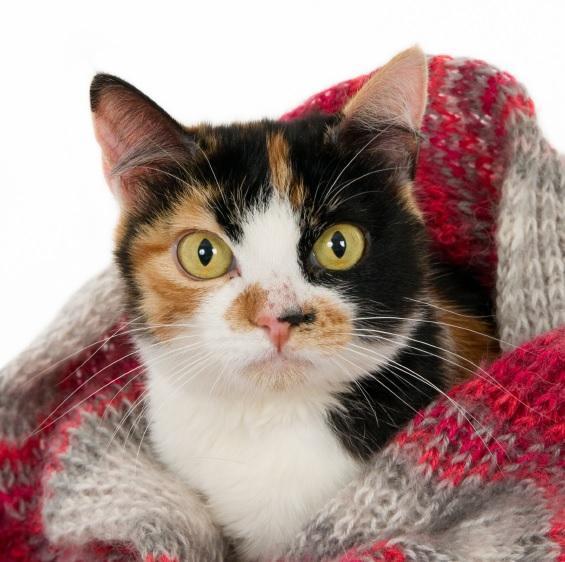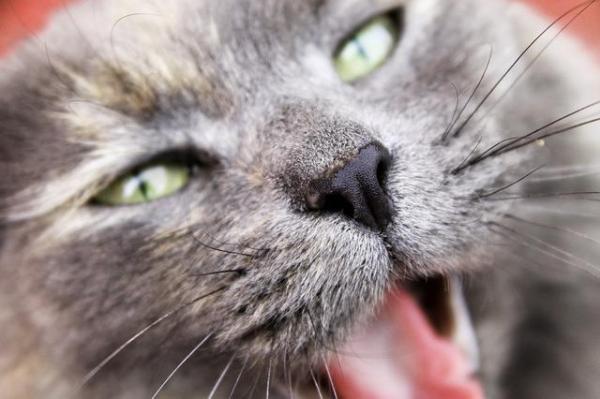Home Remedies for a Cat Cold



See files for Cats
Did you know that there are home remedies for a cat cold? Cats are prone to respiratory diseases, the most common being the common cold.
Have you seen your kitten less active than normal, seeking warmth with watery eyes and sneezing? It most likely has a cold.
It is a mild but not least important problem. Next, at AnimalWised we inform you about colds in cats and the home remedies you can provide them at home before going to the vet.
Cat colds
This respiratory disease can be simple and temporary, but if we do not help our friend to overcome it by treating its symptoms there may be complications that can turn into secondary diseases of the respiratory system. There is no direct cure for a cold, it is cured by letting the virus develop whilst suffering its symptoms until the disease ends, usually within 10 days. As it is a mild disease we can try to follow a symptomatic treatment at home, but always bearing in mind that if your pet gets worse then we will have to go to the vet.
The disease in cats has nothing to do with what occurs in humans, so we can not infect each other.
Colds usually occur in the winter months due to the low temperatures, but it is also very common during the hot months due to air currents and temperature changes. As with most respiratory diseases that occur in cats, the cold, like influenza, is a disease which is highly contagious. Because of this, if we find that one of our domestic cats is suffering from a cold and it lives with more cats, we must isolate it as much as possible during the viral process and especially wash our hands thoroughly before and after being with it.
In healthy adult cats the process will last about 10 days but for little kittens, nursing mothers, ill individuals and elderly animals a simple cold can lead to complications and result in more serious problems such as pneumonia. We therefore recommend that if your cat's profile is among one of these weaker ones then, when faced with a cold, you should take it directly to your veterinarian. However, if our cat normally enjoys good health and is an adult we can help it in a calmer and cheaper manner at home by helping it overcome the cold before the 10-day average which it usually lasts.
The fact that our friend has caught a cold indicates that it has likely had low defenses because of some dietary deficiency. So we must reinforce its immune system and check that it does not have some other problem or disease that may have caused the lowering of its defenses.
The best prevention is to follow the vaccination schedule set out by the vet. In addition we must always be careful with air currents and temperature changes.

Symptoms of a cold in cats
To detect whether our cat has a cold we must observe the symptoms, which luckily are quite obvious and clear:
- Shortness of breath
- Nasal and eye discharge
- Slight fever
- Sneezing
- Mild lethargy
- Mild loss of appetite
- Slight conjunctivitis and swelling of the third eyelid
- Sore throat
- Coughing

How to help my cat to overcome a cold?
Next we explain a number of medicines and basic elements to treat the annoying symptoms of our sick companion's cold. We must keep in mind that if we have to give it some medicine it extremely important that this be prescribed and dosed by a vet and to remember that cats are very sensitive to medication and so we risk intoxicating them if we give them human drugs or doses that we believe to be correct, so we must always go to the vet in these cases.
The care and remedies you can give your cold-sick kitty are:
- Help them eat, as by itself it will eat little or not at all due to the lack of appetite caused by the viral process. As it is vital that the animal be nourished so that its immune system is strengthened we must help stimulate its appetite or give it the food ourselves. Due to the cold it will struggle to notice smells and flavors so give it hot food that has a strong smell or offer it food that, even if cold, will have a strong smell, like canned tuna. You can soak its usual dry feed with chicken broth to soften the feed and give it much more flavor and making it easier for our cat to eat it. If you see it struggles to swallow due to throat irritation we recommend you mash the food to make it much easier to swallow and digest. If it still does not eat by itself we must bring the food to the mouth and nose and even slightly open mouth and make it try a little, perhaps this will help it get its appetite back. Another way is to smear food on a front leg as this will make it lick it clean and maybe make it feel like eating something.
- It is very important that you give it heat in a suitable room temperature and with blankets where it can curl up and sleep.
- We must provide abundant fresh water since this viral process easily produces dehydration.
- Avoid all possible air currents in the house. Air currents are undesirable as they will only worsen its condition.
- Help it clean its eyes and nose regularly to stop annoying tears and snot accumulating and generating scabs and hygiene problems. With a sterile gauze and saline solution you can clean your cat's nose and eyes, using a different gauze for each eye and one for the nose, thus avoiding possible contagion. Like so our furry patient will breathe and see better. In addition, if suffering from conjunctivitis in the eyes we must clean these with a ophthalmic solution prescribe by the vet. If we find that it has a very stuffy nose we must administer saline solution into the nose to facilitate its cleaning and unclogging.
- Increase humidity with a humidifier. If you do not have a humidifier or vaporizer you can provide steam, for example you can run very hot tap water whilst keeping the door and bathroom window closed and like so accumulate steam. Then have your cat stay in the area, best if accompanied by you, for a few minutes (maximum 15 minutes) breathing the steam. This will help it move and expel mucus.
- Let it rest a lot and sleep peacefully. Do not make it play or move, it needs to regain his strength.
- Once the process has passed it will be good that we help it by preventing possible relapses. We can do this with natural supplements like homoeopathy for cats that stimulate its immune system, such as beta-glucans.
- It is important that if past 4 or 5 days of the viral process and doing all of the above our cat does not improve, we must go to the vet immediately as likely the condition has suffered some complications and it should therefore be treated as soon as possible.

This article is purely informative. AnimalWised does not have the authority to prescribe any veterinary treatment or create a diagnosis. We invite you to take your pet to the veterinarian if they are suffering from any condition or pain.
If you want to read similar articles to Home Remedies for a Cat Cold, we recommend you visit our Breathing diseases category.






 My new kitten was actually 5 months old upon first visit to the vet( the day after I got it). Snotty nose and coughing. Weighed only 2.1 pounds.
My new kitten was actually 5 months old upon first visit to the vet( the day after I got it). Snotty nose and coughing. Weighed only 2.1 pounds. 



